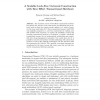Free Online Productivity Tools
i2Speak
i2Symbol
i2OCR
iTex2Img
iWeb2Print
iWeb2Shot
i2Type
iPdf2Split
iPdf2Merge
i2Bopomofo
i2Arabic
i2Style
i2Image
i2PDF
iLatex2Rtf
Sci2ools
161
click to vote
WDAG
2010
Springer
2010
Springer
A Scalable Lock-Free Universal Construction with Best Effort Transactional Hardware
The imminent arrival of best-effort transactional hardware has spurred new interest in the construction of nonblocking data structures, such as those that require atomic updates to k words of memory (for some small value of k). Since transactional memory itself (TM) was originally proposed as a universal construction for crafting scalable lock-free data structures, we explore the possibility of using this emerging transactional hardware to implement a scalable, unbounded transactional memory that is simultaneously nonblocking and compatible with strong language-level semantics. Our results show that it is possible to use this new hardware to build nonblocking TM systems that perform as well as their blocking counterparts. We also find that while the construction of a lock-free TM is possible, correctness arguments are complicated by the many caveats and corner cases that are built into current transactional hardware proposals.
| Added | 15 Feb 2011 |
| Updated | 15 Feb 2011 |
| Type | Journal |
| Year | 2010 |
| Where | WDAG |
| Authors | Francois Carouge, Michael F. Spear |
Comments (0)

